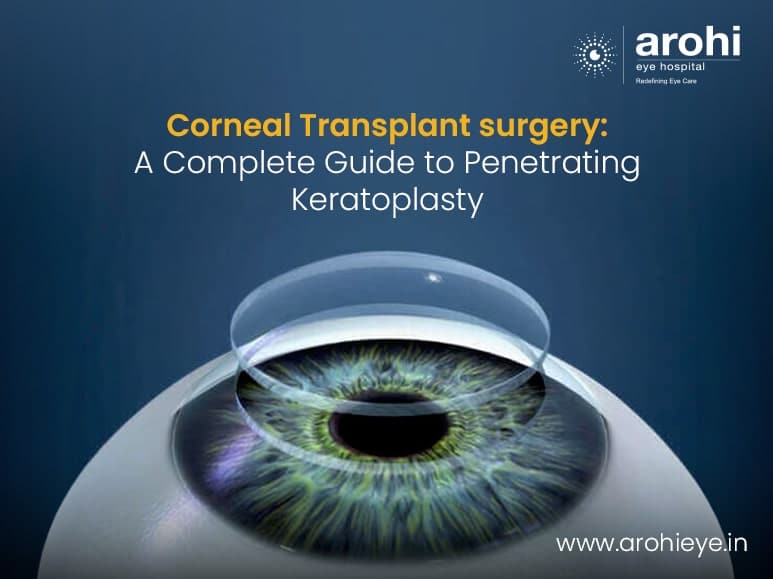Article Reviewed By: Dr. Shradha Goel
Table of Contents
Understanding the Cornea and Its Diseases
What is Penetrating Keratoplasty?
Indications for PKP:
Risks and Complications:
Recovery and Aftercare
Unlock Precision Eye Care and Excellence at Arohi Eye Hospital
Ever wonder how, with a simple surgery, you can transform your vision and give it new life? Well, it might sound like a dream for many, but with the help of Corneal transplant surgery (Penetrating Keratoplasty), it is a reality today. It is like stepping out of the world of blurriness and stepping into the world of clarity.
This advanced surgical procedure represents a significant advancement in vision correction technology. It goes beyond traditional eyesight improvement, offering patients a new perspective on the world. This single surgery has the potential to profoundly impact one’s quality of life and provide them with an enhanced vision.
In this blog, we’ll discuss what is PKP, its procedure, recovery, and aftercare and what precautions you should take to help your vision.
Understanding the Cornea and Its Diseases
Before moving on to PKP surgery, let’s first understand what cornea is and what diseases can compromise its function.
The cornea is the dome-shaped transparent outer layer of the eye covering the iris, pupil, and anterior chamber. Its basic function is to act as a protective barrier and shield the eye from dust, germs, and other harmful particles. Additionally, it helps focus the light that enters our eyes, forming a clear image of the retina in the back of our eyes.
However, various corneal diseases can compromise its function and lead to vision impairment. These conditions include corneal abrasions, ulcers, keratitis, dystrophies, and keratoconus. These conditions can be addressed and can be treated with various techniques. From medications and corrective lenses to surgery such as Penetrating Keratoplasty (PKP), these treatments have proven helpful in preserving vision and maintaining eye health.
For comprehensive evaluation and personalized treatment recommendations, consider visiting the best eye hospital in Mumbai. Here, you can undergo thorough assessments to determine your candidacy for corneal transplant surgery, ensuring optimal outcomes and restored vision.
What is Penetrating Keratoplasty?
Penetrating keratoplasty (PKP) is a surgical procedure that replaces the damaged or diseased cornea with a healthy one. DSEK or DMEK PKP surgeries, unlike other corneal transplant procedures, replace the whole thickness of the cornea. This approach restores quality vision, improves vision, and prevents further damage to the cornea.
Pre-surgical planning:
During the pre-planning for this surgery, the doctors will do a proper evaluation of your eyes and understand your overall ocular health and also evaluate your visual potential and whether there is a need for a corneal transplant.
Once satisfied with the evaluation, the doctors will assess the corneal topography and biometry to understand the cornea’s curvature and thickness. They will also take biometry measurements, such as axial length and keratometry, which are needed for the Corneal Transplant surgery. Then, they’ll select an appropriate donor for the cornea based on its tissue quality, endothelial cell count, and size.
Surgery day :
- On the day of the surgery, the doctors will perform a proper check-up to assess your condition and look for any complications beforehand.
- They will use local anesthesia with sedation or general anesthesia to minimize the discomfort or any pain. However, this depends on the patient’s preference and medical condition.
- The surgeon precisely outlines and prepares the recipient’s cornea for transplantation, eliminating any diseased or damaged tissue to pave the way for the donor cornea.
- They next carefully position the donor cornea on the recipient’s eye and suture it in place with microsurgical methods, making sure the sutures are appropriately aligned and tensioned to facilitate the graft’s healing and integration.
Post-surgery care:
After the surgery, you might feel temporary discomfort, blurriness, and sensitivity to light as your eyes are still healing. It may take several months for your vision to stabilize. You must also attend all your follow-up appointments to see if your eyes are healing properly without any complications and monitor the progress.
Indications for PKP:
Well, Corneal Transplant Surgery (Penetrating Keratoplasty)is recommended for various conditions. However, it is often recommended when the cornea is damaged or diseased beyond repair, and replacement is the only option. Other indications can be infections, injuries, or any other previous surgeries which can damage or impair your vision.
Additionally, PKP may be necessary for treating corneal degenerations like Fuchs’ dystrophy, corneal perforation, or severe thinning. All of these conditions can lead to complete vision loss, and PKP serves as a vital intervention for maintaining corneal integrity and healthy visual function. While there are other alternative surgeries available, they might not be as effective in securing vision health in such extreme situations.
Risks and Complications:
Well, this surgery might be life-changing and have a lot of benefits, but Penetrating Keratoplasty (PKP) carries inherent risks and complications.
- One of the primary complications can be the rejection of the donor cornea. It happens when the recipient’s immune system attacks the transplanted tissues, which can lead to redness, pain, and vision changes.
- Also, this surgery has a high risk of infection. If left untreated, this can lead to severe inflammation, which can permanently cause vision loss.
- Changes in vision can lead to astigmatism or irregularities in corneal shape, which can lead to complications and may require further corrections.
That’s why close monitoring and regular checkups with a retina Cornea specialist or eye doctors are required to minimize risk and achieve long-term better outcomes.
Recovery and Aftercare
Several months typically pass for recovery after Penetrating Keratoplasty (PKP). The weeks following the surgery see a gradual improvement in discomfort. Essential regular follow-up appointments allow for the monitoring of healing progress and the assessment of visual acuity. Advising patients to avoid strenuous activities, eye rubbing, and swimming in the early recovery stages helps prevent complications.
After this corneal transplant surgery (PKP) adherence to prescribed medications, including eye drops to reduce inflammation and prevent infection, is crucial for successful healing. Protective measures such as wearing eye shields at night help safeguard the eye and promote optimal recovery.
Unlock Precision Eye Care and Excellence at Arohi Eye Hospital
In conclusion, Penetrating Keratoplasty (PKP) offers hope for individuals with corneal diseases by restoring vision and improving quality of life. Despite potential risks, PKP remains a vital intervention with transformative outcomes. Consultation with a healthcare provider is paramount for personalized guidance and decision-making regarding this vision-saving procedure.
When contemplating PKP, entrusting Arohi Eye Hospital emerges as the optimal choice. We have one of the finest Cornea Specialists in Mumbai dedicated to delivering unparalleled expertise and compassionate care. With a commitment to excellence and a track record of success, we stand as a beacon of hope for those seeking restoration of vision and a brighter future.
So don’t hesitate and schedule your appointment today and start your journey to clarity today.
Dr. Shradha Goel
Dr. Shradha Goel, Chief Surgeon at Arohi Eye Hospital, is a renowned Phaco-LASIK surgeon with over 10,000 surgeries to her credit. She earned her MBBS from Grant Medical College, Mumbai, and a Master’s in Ophthalmology from Kasturba Medical College, Manipal. As a member of the American Academy of Ophthalmology, Dr. Goel specialises in LASIK, refractive errors, and cataract treatments.


